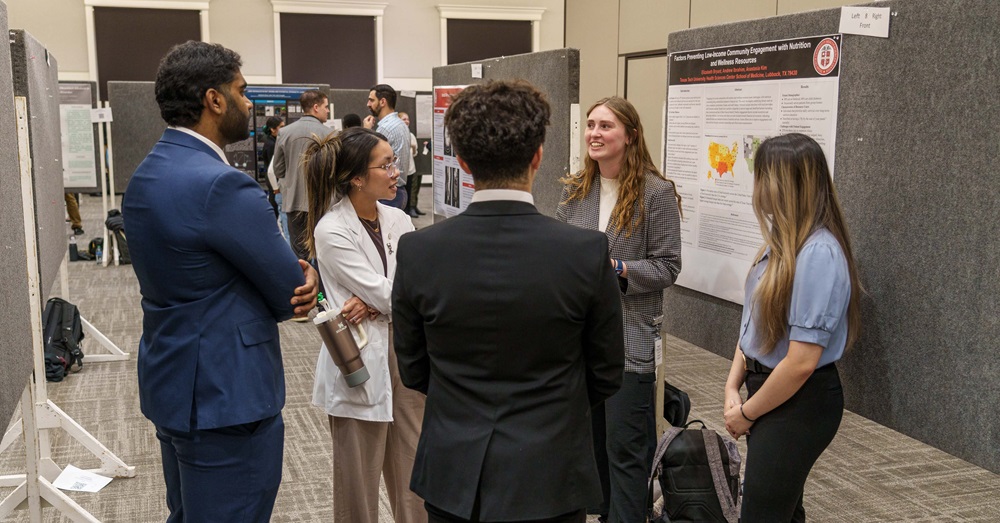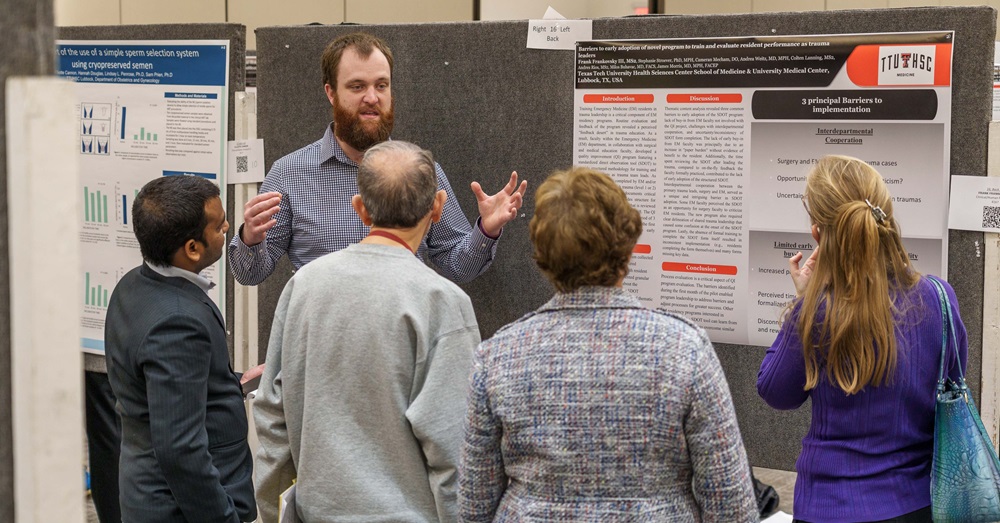TTUHSC’s Graduate School of Biomedical Sciences Hosts 36th Student Research Week

The 36th annual Student Research Week was held Feb. 28-March 1
Maintaining a delicate balance between neural excitation and inhibition are keys to healthy cognition and behavior. That message was delivered and demonstrated by students scientists Feb. 28-March 1 when the Texas Tech University Health Sciences Center (TTUHSC) Graduate School of Biomedical Sciences hosted its 36th Annual Student Research Week.
Student Research Week allows TTUHSC student investigators to showcase their work and hear presentations from distinguished national speakers related to the year’s specific theme. The theme for 2024 was, “Brain Wars: May the Neurons Be With You.” Graduate School of Biomedical Sciences students Praneetha Panthagani and Neha Sawant served as co-executive directors for the 2024 event. Other 2024 officers included Robert Barnes (vice director of poster competition), Manikantha Dunna (vice director of operations) and Megan Skains (vice director of marketing).
Unlike the past several years when the pandemic forced the introduction of virtual presentations, the 2024 event was held entirely in person. Panthagani said the committee also implemented several changes to the format used for Student Research Week in previous years.
“We had a relatively larger committee, which helped us distribute the workload and responsibilities more effectively, resulting in a smoother and less stressful organizing process,” Panthagani said. “Additionally, we introduced an unjudged poster session where students were allowed to present their work without the pressure of evaluation, giving them a taste of a conference-like atmosphere.”

Student Research Week allows TTUHSC student investigators to showcase their work
A functional nervous system relies on two essential forces: excitation and inhibition. Keeping these in balance is very critical for our mental and physical health, and any deviation from this state of balance can potentially lead to a disease or disorder. Panthagani said TTUHSC students study a variety of disorders related to brain excitation and inhibition, such as pain, Alcohol Use Disorder and Alzheimer’s disease and others.
“Brain Wars also resembles an arena where students from different subjects compete in a friendly way,” Panthagani explained. “This helps them learn from each other's ideas and skills while encouraging collaboration and showing how research in biology can involve many different perspectives.”
Student Research Week 2024 featured three keynote speakers, each described by Panthagani as trailblazers in their respective fields of research. The trio included George Koob, Ph.D., a director of the National Institute of Alcohol Abuse and Alcoholism whose allostatic model of addiction has established the doctrine for the field. His research has deepened the understanding of the effects alcohol and drug addiction have on the brain, including the neuroadaptations that lead to the development of dependence.
Other keynote speakers included George Perry, Ph.D., a professor of biology and chemistry at the University of Texas at San Antonio, and Allan Basbaum, Ph.D., a professor and chair in the Department of Anatomy at the University of California, San Francisco. Perry’s groundbreaking work on the role of oxidative stress in Alzheimer's disease has fundamentally reshaped the understanding of this devastating condition. Basbaum’s research includes the study of central and peripheral mechanisms that process pain and itch messages; researching the molecular mechanisms that contribute to chronic pain after tissue and nerve injury; and using calcium imaging to investigate the mechanism of action of general anesthetics.
The 2024 event also included an interprofessional education opportunity (“FOMO sapiens: Cutting through the noise in the age of excess”) in which four panelists discussed the effect of constant and immediate access to social media and news on the mental health of students and the population in general. The panel discussion included Joy Osaji, M.D., a third-year TTUHSC resident; Bryan Mclaughlin, an associate professor of advertising and brand strategy at Texas Tech University’s (TTU) College of Media & Communication; Jeremy D. Bailoo, Ph.D., a developmental psychobiologist and assistant professor of cell biology and biochemistry at TTUHSC; and Jay Killough, Ph.D., director of TTU’s University Career Center.
A highlight of every Student Research Week is the annual poster competition, and there were more than 260 entries for the 2024 contest. Panthagani said the variety of research, the thoroughness of the statistical analysis and the creativity used in figure design rivals that of any international conference she and her Student Research Week leadership team have attended.
As a new feature for 2024, the Student Research Committee provided an opportunity for student researchers to present a “Lightning Talk” between keynote speaker sessions. Barnes said 49 students applied to be a Lightning Talk presenter and eight were ultimately selected. In addition, more than 96% of those who submitted abstracts in 2024 also presented their research in person, a vast improvement over the last several years when approximately 15% to 18% of abstracts also presented in person.
“From case reports of patients with diseases so rare that they aren't included in medical school curriculum to graduate research being conducted at the cutting edge of their fields, we are amazed every year at the quality of research presented at Student Research Week,” Barnes added.
2024 Student Research Week Poster Competition Award Winners
Lorenz O. Lutherer, M.D., Ph.D., Clinical Research Award
Taha Hassan
Undergraduate Division (Sponsored by CISER):
1st Place: Jocelyn Medina
2nd Place: Jordan Sanchez
Clinical/Human Category I
1st Place: Madison Bachler
2nd Place: Vaishnavi Chiddarwar
3rd Place: Ananya Potu
Clinical/Human Category II
1st Place: Caroline Finney
2nd Place: Sai Pranathi Bingi
3rd Place: Katherine Lakey
Bench/Basic Research I
1st Place: Skyler Tran
2nd Place: Harry May
3rd Place: Manikantha Dunna
Bench/Basic Research II
1st Place: Flavia Sardela de Miranda
2nd Place: Syed Tareq
3rd Place: Yash Mehta
Related Stories
National Academy of Inventors Names TTUHSC Faculty Senior Members
The National Academy of Inventors (NAI) has designated two current and one former TTUHSC faculty researchers as Senior Members.
TTUHSC Cancer Researcher Honored by National Academy of Inventors
C. Patrick Reynolds, M.D., Ph.D., director of the School of Medicine Pediatric Cancer Research Center at TTUHSC, has dedicated his life as a researcher to developing treatments for childhood cancers.
TTUHSC’s Hudson Set to Serve as President for Society of Clinical Research Associates
The Society of Clinical Research Associates (SOCRA) has elected Texas Tech University Health Sciences Center’s (TTUHSC) Catherine Hudson, Dr.P.H., as its president for 2025-2026.
Recent Stories
National Academy of Inventors Names TTUHSC Faculty Senior Members
The National Academy of Inventors (NAI) has designated two current and one former TTUHSC faculty researchers as Senior Members.
The John Wayne Cancer Foundation Surgical Oncology Fellowship Program at Texas Tech University Health Sciences Center Announced
TTUHSC is collaborating with the John Wayne Cancer Foundation and has established the Big Cure Endowment, which supports the university’s efforts to reduce cancer incidence and increase survivability of people in rural and underserved areas.
TTUHSC Receives $1 Million Gift from Amarillo National Bank to Expand and Enhance Pediatric Care in the Panhandle
TTUHSC School of Medicine leaders accepted a $1 million philanthropic gift from Amarillo National Bank on Tuesday (Feb. 10), marking a transformational investment in pediatric care for the Texas Panhandle.
